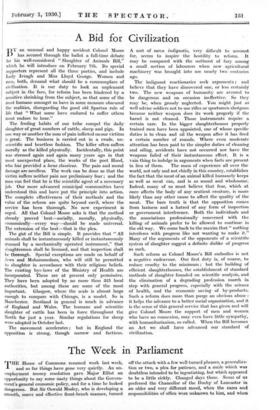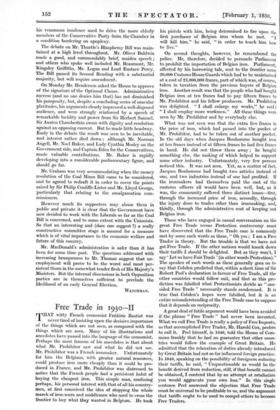The Week in Parliament
THE House of Commons resumed work last week, and so far things have gone very quietly. An un- employment money resolution gave Major Elliot an opportunity to say some nasty things about the Govern- ment's general economic policy, and for a time he looked dangerous. But Sir Oswald Mosley, who is developing a smooth, suave and effective front-bench manner, turned off the attack with a few well-turned phrases, a generaliza- tion or two, a plea for patience, and a smile which was doubtless intended to be ingratiating, but which appeared to be a little sickly. Changed days these. Some of us preferred the Chancellor of the Duchy of Lancaster in an older and very different mood, when the cares and responsibilities of office 'were unknown to him, and when his venomous insolence used to drive the more elderly members of the Conservative Party front the Chamber in a condition bordering on apoplexy.
The debate on Mr. Thurtle's Blasphemy Bill was main- tained at a high level throughout. Mr. Oliver Baldwin made a good, and commendably brief, maiden speech ; and others who spoke well included Mr. Beaumont, Mr. Kingsley Griffiths, Mr. Logan and Lord Eustace Percy. The Bill passed its Second Reading with a substantial majority, but will require amendment.
On Monday Mr. Henderson asked the House to approve of the signature of the Optional Clause. Administrative success (and no one denies him that) has not diminished his pomposity, but, despite a concluding series of oracular platitudes, his arguments clearly impressed a well-disposed audience, and were strongly reinforced by a speech of remarkable lucidity and power from Sir Herbert Samuel. Sir Austen Chamberlain swam with dignity and resolution against an opposing current. But he made little headway. Early in the debate the result was seen to be inevitable, and interest rather died down ; although Mr. Norman Angell, Mr. Noel Baker, and Lady Cynthia Mosley on the Government side, and Captain Eden for the Conservatives, made valuable contributions. Mr. Baker is rapidly developing into a considerable parliamentary figure, and should go far.
Mr. Graham was very accommodating when the money resolution of the Coal Mines Bill came to be considered, and he agreed to redraft it in order to cover the points raised by Sir Philip Cunliffe-Lister and Mr. Lloyd George, particularly that relating to the amalgamation com- missioners.
However much its supporters may abuse them in public and private it is clear that the Government have now decided to work with the Liberals so far as the Coal Bill is concerned, and to some extent with the Unionists. So that an interesting and (dare one suggest ?) a really constructive committee stage is assured for a measure which is of vital importance to the economic welfare and future of this country.
Mr. MacDonald's administration is safer than it has been for some time past. The questions addressed with increasing brusqueness to Mr. Thomas suggest that un- employment will prove to be the worst and most per- sistent thorn in the somewhat tender flesh of His Majesty's Ministers. But the internal dissensions in both Opposition parties are in themselves sufficient to preclude the likelihood of an early General Election.
WATCHMAN.







































 Previous page
Previous page